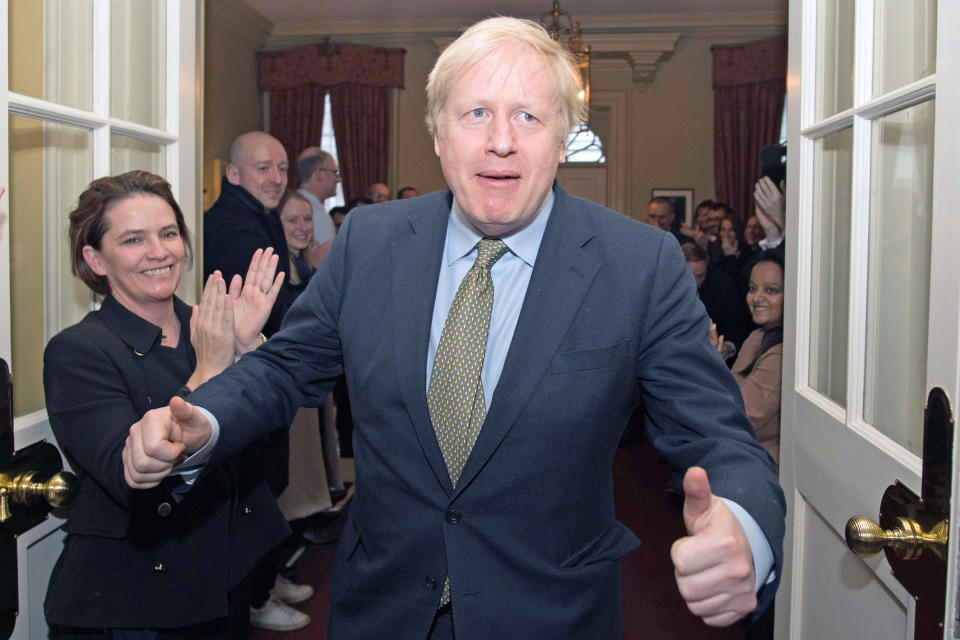Why no-deal Brexit is still on the table despite Boris Johnson's election victory

Boris Johnson’s simple and constantly repeated pledge to ‘get Brexit done’ during the general election campaign appears to have swept him back into Downing Street.
A Brexit withdrawal bill is finally expected to pass in parliament, allowing Britain to leave the UK by 31 January.
But voters, firms and investors hoping for an end to the political uncertainty and drama over Brexit, or hoping that Britain can move on and address other issues, could be left disappointed even if MPs back the deal.
The past few years of political turmoil have largely revolved around the terms of Britain’s divorce, with formal negotiations over the future relationship and trade deal yet to even begin.
The prime minister’s withdrawal agreement only commits to a one-year transition period where Britain stays under EU rules, with the terms of trade beyond 2020 still up in the air.
Why no-deal could still threaten the economy even after Brexit
If Britain cannot negotiate a trade deal at unprecedented speed or extend the transition, it could still face a radical rupture and significant new trade barriers from the end of 2020.
“Until we get more clarity on the transition, this all means the start of 2020 will be an uncertain phase for the UK economy,” wrote James Smith and Chris Turner of ING on Friday.
“For many firms, an abrupt end to the transition period — which would see the majority of the UK leave the single market and customs union — would be very similar to a ‘no deal’ Brexit.”
They warn that if an extension is not agreed by the EU’s June deadline, firms and government departments could also be forced into yet more costly contingency planning.
READ MORE`: Boris Johnson victory sparks surge in voters Googling ‘move to Canada’
“Investment will remain capped,” they add, with yet more uncertainty over the detail of UK-EU relations beyond 2020 deterring bigger and long-term investments.
Even if an extension is agreed, the sector-by-sector, rule-by-rule minutiae of trade talks typically take years to thrash out. Negotiations often involve controversial trade-offs, with better access for one sector or greater freedom to diverge from EU rules potentially threatening access for other sectors reliant on EU trade.
“It could still be some time before we get better clarity on the future relationship for specific industries,” the ING analysts added.
There is considerable debate now among economic analysts about whether the prime minister is likely to extend the Brexit transition period.
Why Johnson might keep a no-deal Brexit on the table

On the one hand, Johnson has already vowed not to extend the transition.
Economists at RBC Capital Markets said he wanted to maintain the impression he was willing to leave without agreement for as long as possible, according to Reuters. This could help as a negotiating tool, or at least help Johnson strike a tougher pose for UK voters.
An extension is seen as threatening the support of some Leave voters, and risking a backlash from both Conservative MPs and Nigel Farage’s Brexit party. Staying under EU rules for a longer period and signing up to further EU budget payments would be controversial.
READ MORE: How the pound’s exchange rate after the election will affect you
Economists at Citi noted that Johnson would be particularly keen not to alienate voters in newly Conservative seats who seemingly warmed to his hardline Brexit rhetoric.
Smith and Turner of ING note that the size of Johnson’s majority also means there is “very little parliament can do about it” compared to MPs’ recent success in thwarting the government.
Some more moderate leading Conservative MPs involved in past efforts to block a hard Brexit are also no longer in parliament.
Why Johnson may agree to a longer period under EU rules
Smith and Turner of ING’s verdict is that an extension is “more likely than not” given the size of Johnson’s election victory and the damage of a sharp break and new trade barriers.
“An abrupt end to the transition period would be economically damaging, could limit UK negotiating power in future trade talks, and would also draw time/money away from other domestic priorities,” they wrote.
They note Johnson’s majority could insulate him from pressure on the right for a swift break. A potential five-year term could insulate him from fears of electoral damage, as initial controversy over an extension could fade by the time he has to go to the polls again.
READ MORE: Mail, rail and water stocks turbo-boost UK markets after Tory win
“With such a comfortable winning margin Johnson is not reliant on any faction of his party, in particular the hard-Brexiteers who might have tried to steer him toward a hard Brexit at the end of the transition period,” wrote RBC Capital Markets economists.
But they point out Johnson may try to rebrand the extension and “give the impression” it is not the same as the transition period the party vowed not to extend in its manifesto.

 Yahoo Finance
Yahoo Finance 